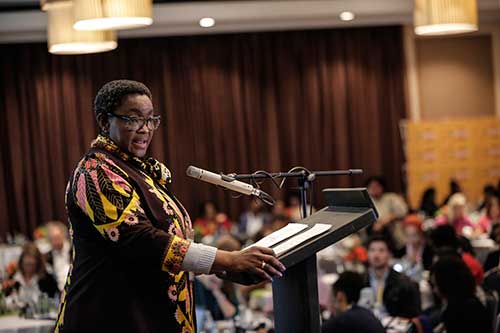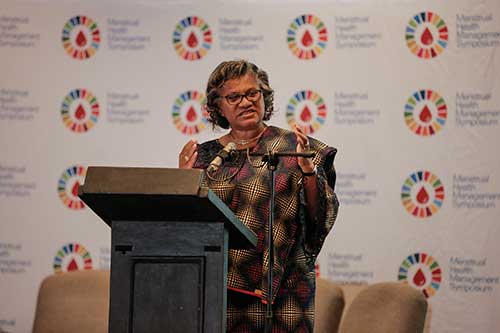News
A turning point for girls' and women’s menstrual health in Africa

JOHANNESBURG, South Africa/NAROK, Kenya – “I felt embarrassed to be a girl and felt like it was a punishment,” recalled 13-year-old Faith, describing her first period.
She was living in a boarding school in Narok County, Kenya, when it happened. A friend taught her to use a cloth to manage the blood. “I was not knowledgeable about how and why it happens, and what to expect. So, naturally, I was scared and confused.”
Her experience is all too common. Girls around the world lack basic knowledge about their sexual and reproductive health and struggle to access menstrual health supplies. Many grapple with shame and taboos surrounding menstruation.
These issues undermine girls’ health and rights. Girls can be subjected to stigma or miss school due to difficulty managing their menstrual hygiene. Faith understands these challenges. “I hated going to class,” she told UNFPA.
These concerns are being addressed at this week’s Menstrual Health Management Symposium in Johannesburg, South Africa. It is the first such meeting to be held in the region.
Organized jointly by the South African Department of Women and UNFPA, the symposium aims to break down taboos and build positive norms around menstruation.
Access to sanitary products, dignified treatment and education on menstrual health management is “a human rights issue that all of us must strive for,” Bathabile Dlamini, South Africa's Minister for Women, said at the symposium.

worship and all other important spaces in our lives,” said Bathabile
Dlamini, South Africa's Minister for Women. © UNFPA ESARO/
Gulshan Khan
Ending shame, empowering women
An estimated one in ten girls in sub-Saharan Africa misses school at some point during their period, Ms. Dlamini said. “Research shows that up to seven million schoolgirls in South Africa cannot afford sanitary pads,” she added.
“How do we empower young girls to know that menstruation is not something to be ashamed of? We must stop period shaming in our homes, our schools, our places of worship and all other important spaces in our lives.”
Improving sexual and reproductive health can yield a significant return on investment, including by increasing women’s and girls’ participation in education and the economy. But there are enormous challenges that must be addressed first.
“African sexuality is very much a hidden thing… [but not talking about sex] perpetuates stigma and discrimination,” said Dr. Julitta Onabanjo, UNFPA’s Regional Director for East and Southern Africa. “Access to sexuality education is vital for menstrual literacy but also for self-confidence, self-esteem and self-worth.”
Men and boys must be involved in ending menstruation stigma, she added. “We want them to be allies and supporters.”
And the health aspects of menstruation cannot be overlooked. “As we normalize menstruation, we must not trivialize menstrual disorders,” Dr. Onabanjo said.

said Dr. Julitta Onabanjo, UNFPA’s Regional Director for East and
Southern Africa. © UNFPA ESARO/Gulshan Khan
Committed to change
More than 300 participants are attending the event, including government representatives, academics, non-governmental organizations, UN agencies, youth groups and other partners. Actress Hlubi Mboya, musician KrTC of Hip Hop, and music celebrity and menstrual health champion King Kaka are also attending.
A key outcome of the symposium will be the launch of an African Task Force dedicated to improving menstrual health management in Africa.
“Let this symposium mark a turning point for us across the continent,” Dr. Onabanjo said.
As for Faith, in Kenya, she is doing her own part to educate and empower her peers.
“I have now taken it upon myself to help other girls in school experiencing their first menstrual period,” she said. “Now I know that it’s a normal human body function and there is no need to be embarrassed.”